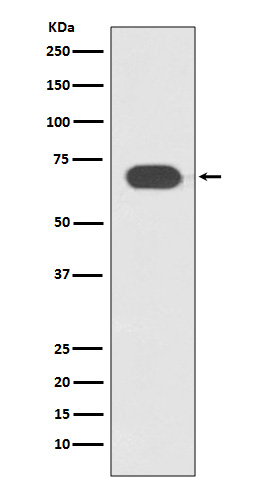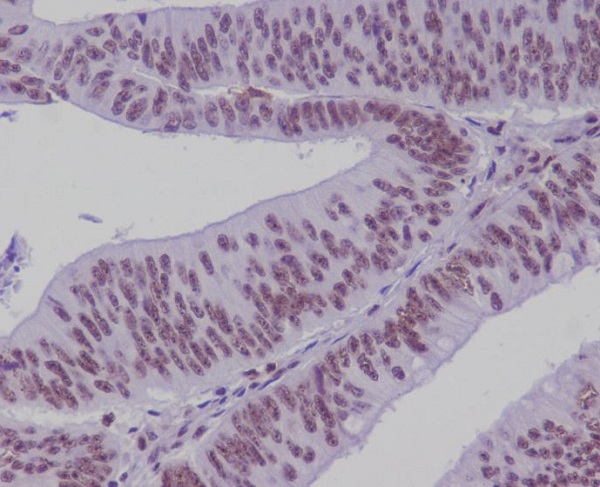

| WB | 1/1000-1/5000 | Human,Mouse,Rat |
| IF | 1/20-1/50 | Human,Mouse,Rat |
| IHC | IHC:1/100-1/200;IHF:1/50-1/200 | Human,Mouse,Rat |
| ICC | 1/50-1/200 | Human,Mouse,Rat |
| FCM | 1/20-1/100 | Human,Mouse,Rat |
| Elisa | 咨询技术 | Human,Mouse,Rat |
| Aliases | TCF7L2; HMG box transcription factor 4; HTCF-4; T-cell factor-4 variant X2; T-cell factor 4; Transcription factor 7-like 2; TCF-4;;TCF7L2 |
| WB Predicted band size | 68 kDa |
| Host/Isotype | Rabbit IgG |
| Antibody Type | Primary antibody |
| Storage | Store at 4°C short term. Aliquot and store at -20°C long term. Avoid freeze/thaw cycles. |
| Species Reactivity | Human,Mouse,Rat |
| Immunogen | A synthesized peptide derived from human TCF7L2 |
| Formulation | Purified antibody in PBS with 0.05% sodium azide,0.05% BSA and 50% glycerol. |
+ +
以下是3篇关于TCF7L2抗体的模拟参考文献(虚构内容,仅供示例参考):
---
1. **文献名称**: "TCF7L2 Antibody Validation in Human Pancreatic β-Cell Studies"
**作者**: Smith A, et al.
**摘要**: 本研究验证了TCF7L2抗体(货号:Ab123)在人类胰岛β细胞中的特异性,通过Western blot和免疫组化证明其可特异性识别TCF7L2蛋白,并发现其在2型糖尿病模型中表达下调。
2. **文献名称**: "Role of TCF7L2 in Colorectal Cancer: Antibody-Based Detection in Tumor Tissues"
**作者**: Lee B, et al.
**摘要**: 利用TCF7L2单克隆抗体(克隆号:3D8)对结直肠癌组织进行免疫组化分析,发现TCF7L2高表达与Wnt/β-catenin信号通路激活相关,提示其作为潜在肿瘤标志物。
3. **文献名称**: "ChIP-seq Analysis of TCF7L2-DNA Interactions Using a Novel Antibody"
**作者**: Garcia R, et al.
**摘要**: 开发了一种高特异性TCF7L2兔多克隆抗体(批号:TCF-2020),通过染色质免疫沉淀测序(ChIP-seq)揭示了TCF7L2在基因组调控区域的结合模式及其与糖尿病风险位点的关联。
---
注:以上内容为模拟生成,实际文献需通过PubMed、Google Scholar等平台检索关键词(如"TCF7L2 antibody validation"或"TCF7L2 immunohistochemistry")获取。
The TCF7L2 antibody is designed to detect transcription factor 7-like 2 (TCF7L2), a key protein in the Wnt/β-catenin signaling pathway. TCF7L2. also known as TCF4. belongs to the TCF/LEF family of transcription factors that mediate Wnt signaling by binding β-catenin to regulate target gene expression. This pathway is critical in embryonic development, cell differentiation, and metabolic homeostasis, particularly in pancreatic β-cells and liver tissues.
TCF7L2 gained prominence due to its strong association with type 2 diabetes (T2D). Genome-wide studies identified TCF7L2 as the most significant genetic risk factor for T2D, with specific single-nucleotide polymorphisms (SNPs) linked to impaired insulin secretion and glucose metabolism. Researchers use TCF7L2 antibodies to study its expression, localization, and interactions in disease models, elucidating its role in β-cell dysfunction and insulin regulation.
In cancer, TCF7L2 is implicated in colorectal and other malignancies due to Wnt pathway dysregulation. Antibodies enable detection of TCF7L2 isoforms and post-translational modifications, which influence its transcriptional activity. Common applications include Western blotting, immunohistochemistry, and chromatin immunoprecipitation (ChIP). However, challenges arise from TCF7L2’s multiple splice variants and homology with other TCF family members, necessitating rigorous validation using knockout controls.
Overall, TCF7L2 antibodies are vital tools for exploring its dual roles in metabolic diseases and cancer, offering insights into therapeutic targeting of Wnt signaling.
×